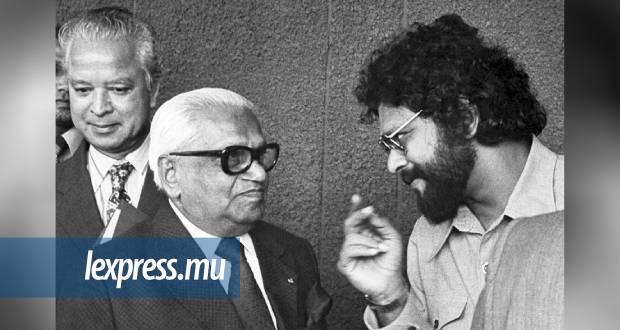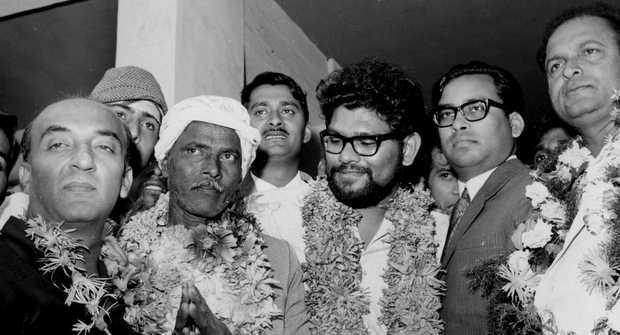Publicité
Radical
The politics of Dev Virahsawmy
Par
Partager cet article
Radical
The politics of Dev Virahsawmy

The linguist served as cultural advisor in a government.
Poet and linguist Dev Virahsawmy passed away recently. While known for his championing of the Kreol language, food security and demilitarization, he was also one of the biggest figures in the history left-wing politics in Mauritius.
The rise in the MMM
Dev Virahsawmy was one of the dominating figures in the history of Mauritian left-wing thought and politics. Much of what would come to dominate his political thought can be traced back to his days as a student in Edinburgh; there he would grow close to political currents demanding home-rule for Scotland and become exposed to political currents such as anarchism and Marxism. It was also during that time that Virahsawmy became a passionate advocate for the recognition of Kreol as a language. While there he wrote a dissertation on the revaluation of Kreol and its place in building a national culture for Mauritius.
Like many in his generation, this obsession with the unifying role of Kreol, was partly the product of the ethnic divisions that became obvious in the 1967 election. On his return to Mauritius, Virahsawmy started writing a series of articles in l’express on the importance of Kreol and it was these articles that brought Virahsawmy into the ‘Club des Etudiants Militants’ and into left-wing politics alongside Paul Bérenger, Venoo Mootien, Jooneed Jeerooburkhan and Zeel Peerun. The group soon shot into national attention. In 1969 the Club wanted to organize a forum at the municipality of Quatre Bornes on independent Mauritius and its problems. The forum was not allowed to be held by the police. And a second attempt to hold the event too was scuttled after the then-mayor O. Hawoldar prohibited the event. That led the Club to organize a march straight to the mayor’s house, only to be met with tear gas and arrests. Then there was the visit of Princess Alexandra whose husband was a director at the British conglomerate Lonrho, which was a major player in Africa. The Club now formally becoming the MMM launched a demonstration against the visit. While protesting outside an official lunch hosted by the Lord Mayor of Port Louis Gaetan Duval for Alexandra, Virahsawmy alongside Bérenger, Jeerooburkhan and Heeralall Bhugaloo were arrested. In a public meeting in February 1970 Virahsawmy explained that the MMM’s economic strategy would rely on the nationalisation of lands, docks, sugar and the transport industry.
 (Dev Virahsawmy founded the MMMSP, a more radical Maoist offshoot of the MMM.)
(Dev Virahsawmy founded the MMMSP, a more radical Maoist offshoot of the MMM.)
Breaking with the MMM
1970 was also the year that Virahsawmy entered parliament. In September he stood as the MMM candidate in No.5 (the home constituency of Prime Minister Sir Seewoosagur Ramgoolam) to fill a seat left vacant by the death of the IFB’s Lall Jugnauth. He got 70 per cent of the vote.
In 1972, while Bérenger, Virahsawmy and some members of the MMM were in Curepipe putting up posters near the municipality, a car full of PMSD activists showed up firing guns. Bérenger dived through a hedge into the backyard of a house while Virahsawmy was in a car with a former dockworker Azor Adelaide while a car -owned by the PMSD’s Nicol Francois - pulled alongside and fired shots. Virahsawmy survived the attack but Adelaide did not. It was the first political murder in independent Mauritius. The attempt on the MMM leadership, the killing of Adelaide and the growing strikes in transport and the docks led by the MMM affiliated union, the GWF – led to the government announcing a state of emergency. Virahsawmy and much of the MMM leadership was hauled off into prison where they remained for a year.
 (Sir Seewoosagur Ramgoolam and Dev Virahsawmy, two heavyweights of Mauritian society each in his own way.)
(Sir Seewoosagur Ramgoolam and Dev Virahsawmy, two heavyweights of Mauritian society each in his own way.)
While in prison, Virahsawmy announced that he was resigning from his parliamentary seat. In his view, he did not accept the extension of parliament’s mandate until 1976 (as part of the 1969 coalition deal) and thus 1972 was the year that the mandate of the 1967 parliament ended. Gaëtan de Chazal who had been elected in 1967 as a candidate of the PMSD had also resigned. In March 1973 the MMM was roiled by an internal crisis with many of its senior figures such as Hervé Masson, Ramesh Seereekissoon and Ramesh Fulena quitting the party. Seereekissoon and Fulena would later join the foreign ministry. Virahsawmy would quit the party to found a more radical Maoist offshoot of the MMM, the MMMSP. Alongside Peter Craig, Alan Ganoo, Alain Laridon and Showkutally Soodhun he would also found a union, the FTU. Virahsawmy’s resignation from parliament in 1972 was based on a simple premise: a by-election would lead an anti-government momentum. But after Sir Seewoosagur Ramgoolam came up with a 1973 constitutional amendment effectively abolishing by-elections by allowing the government to nominate replacements for vacant seats (there were four by-elections pending at the time), Virahsawmy decided to resume his seat. There was little point in allowing the government to puff up its parliamentary strength under a state of emergency. And at any rate, with 1973 being marked by a good sugar crop, wage raises and a good economy, there was little public protest against the government’s move.
1976 and after
A few months before the 1976 elections, Virahsawmy’s MMMSP underwent its own split with the emergence of the Mauritius MarxistLeninist Party (PMLM) and a war of words began between Virahsawmy and Bérenger, who feared that the MMMSP could lead to a split in the MMM’s votes. The MMM emerged as the largest party in parliament but was kept out of power by a post-election Labour-PMSD coalition. With a slim majority keeping it in power, the government grew no less accommodating and in 1977 banned Virahsawmy’s poem ‘Li’ – written by Virahsawmy in prison in 1972 and supposed to be presented at a cultural event to mark the first anniversary of the MMMSP paper Soley Ruz. It was one of the first examples of a literary work being banned in independent Mauritius.
In March 1977, the MMMSP backed the MMM in municipal elections that year and in November 1977 both parties denied a letter published earlier in Le Cerneen, and then in Weekend, that the MMM in 1971 had approached the Soviets for financial help. Masson explained that the letter was just to ask for money to publish a speech of Soviet leader Leonid Brezhnev in Le Militant. But Virahsawmy – being a Maoist who condemned a ‘social imperialist’ Moscow - was no Soviet ally: in 1979 he handed Soviet amabassador Safronov a letter criticising Soviet support for Vietnam’s invasion of Cambodia, Ethiopia’s occupation of Eritrea and Soviet fishing ships overfishing in the Saya de Malha bank. By November 1979, Virahsawmy announced that his MMMSP was disbanding and would dissolve itself within the MMM. The MMM homecoming would last until 1983 when Virahsawmy threw his weight behind Anerood Jugnauth’s newly-founded MSM in its battle with the rump MMM led by Bérenger. The party was hit by a double-whammy: while former MMM figures like Virahsawmy and Sheila Bappoo accused the MMM of being a pro-capitalist party that would “bring back the days of slavery”, the rest of the MSM referred to an MMM victory as akin to the fall of Cheddi Jagan in Guyana whose ouster was followed by anti-Indian measures in that country. The MMM lost handily. While Virahsawmy was appointed cultural advisor in the new government, the lack of support for promoting the Kreol language led Virahsawmy to ditch that government.
 (Dev Virahsawmy won a by-election in constituency No.5 in September 1970.)
(Dev Virahsawmy won a by-election in constituency No.5 in September 1970.)
That may have ended Virahsawmy’s involvement in active politics, but it did not mean his abandonment of causes he held dear. Virahsawmy’s Soley Ruz and his pioneering protest theatre helped create the space for Kreol to thrive as did his own sheer literary output: between 1972 and 2022 he penned 3,000 poems, 20 short stories, 40 plays, 5 novellas and a novel as well as translating major works by Molière, Lafontaine, Prévert, Keats, Blake, T.S.Eliot into Kreol. His championing of food security never dimmed nor did his concern with sovereignty and de-militarization: in the 1970s he asked questions about the Chagos islands in parliament and more recently, turned his focus on Agalega. While left-wing politics may have ebbed in recent decades, many of the causes that today are taken for granted and now considered common sense such as promoting the Kreol language, food production and sovereignty owe a lot to the left-wing zeal of the 1970s that brought these causes up in the first place. And as part of that, in no small part, to figures such as Dev Virahsawmy.
Publicité
Publicité
Les plus récents






